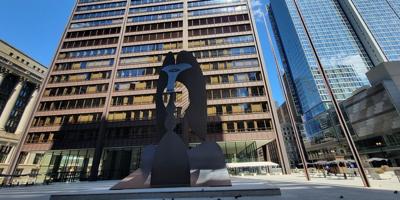
Richard J. Daley Center, Chicago
CHICAGO - Lettuce Entertain You, one of Chicago's most prominent restaurant groups, has been targeted by a new class action lawsuit under both Chicago's new paid leave rules and state wage law, accusing the company of allegedly shorting its workers paid leave and not paying them accrued vacation time.
The lawsuit was filed on Sept. 18 in Cook County Circuit Court by attorney Alvar Ayala, of the Farmworker and Landscaper Advocacy Project (FLAP), of Chicago, against Lettuce Entertain You Enterprises.
According to its website, FLAP is a nonprofit organization with a mission to represent primarily Latino "low-wage workers" in workplace injury and wage disputes "in the cannery, farming, greenhouse, landscaping, meat, nursery, packinghouse, poultry, restaurants and snow plowing industries in Illinois."
The lawsuit was filed on behalf of named plaintiff Jorge Salinas, identified as an employee of Lettuce Entertain You, working at the company's Beatrix restaurant in the Loop as a cook from May to August 2025.
However, the lawsuit seeks to expand the action to potentially include hundreds of people working at more than 60 Lettuce Entertain You restaurants in Chicago and elsewhere in Illinois.
According to the complaint, these could include employees of the following restaurants and restaurant brands: Wao Bao, Ramen San, The Cookie Bar, Beatrix, Tallboy Taco, Joe’s Sea Food Prime Steak and Stoe Crab, Ivy Room, Osteria Via Stato, The Dining Room at Tree Studios, Shaw’s Crab House, RPM Italia, Sushi San, Wildfire, Ema, Gus Sip and Dib, Café Ba Ba Reeba, Bub City, The Bamboo Room, Three Dots and a Dash, Il Porcelino, Salon 61, Tre Dita, Miru, Pizzeria Portofino, Big City Chicken, Frankie’s By the Slice, GEM Catering Events, ABA, The Dalcy, The Oakville Grill and Cellar, RJ Grunts, 167 Events, Summer House Santa Monica, Tokyo Last Call, Mon Ami Gabi, L Woods, Joe’s Live, and Antico Posto.
The lawsuit specifically accuses LEYE of not providing workers with sufficient paid time off under its company paid leave policies. According to the complaint, LEYE maintains paid vacation policies under which LEYE employees will receive paid time off based on the length of time they have worked for the company.
According to the complaint, LEYE employees who have worked for the company for at least one year, receive 5 days of paid time off; workers with three years with the company get 10 days off; workers with 5 years, get 15 days off; and 10-year employees receive 20 days of paid time off.
Further, the complaint asserts LEYE refuses to pay workers their accrued vacation time when they stop working for the company and do not carry forward vacation time from one year to the next.
The lawsuit asserts these policies, at least in part, violate both Illinois state wage and hour law and Chicago's Paid Leave ordinance.
Under the city ordinance, people working at businesses within Chicago city limits are owed 1 hour of paid leave and 1 hour of paid sick leave for every 35 hours worked.
And under the ordinance, employers are required to pay out the cash equivalent of all unused paid time off accrued by workers when they either are terminated or otherwise leave the company.
According to the complaint, Salinas, individually, worked for the company for "hundreds of hours," yet allegedly did not receive any paid time off, despite the city ordinance.
The lawsuit marks one of the highest profile targets of a legal action under Chicago's ordinance since it was enacted by Mayor Brandon Johnson and the Chicago City Council in 2023, over the strong objections of restaurant owners and other business groups in Chicago.
At the time, they warned the ordinance sent a strong anti-business signal that the city would later come to regret, as businesses grapple with ever mounting regulatory costs and burden, plus the constant threat of lawsuits.
In a statement issued at the time the ordinance passed, a coalition of business advocacy groups said of the ordinance:
"With this added burden of the most expensive and complicated paid leave policy in the country, as well as continued supply chain and labor challenges, persistent crime, costly regulations, and skyrocketing property taxes, it is death by a thousand cuts.
"Employers in every neighborhood will be left with no choice but to reduce operations and the number of employees, take their operations and jobs elsewhere, or close.
"City Council has cemented Chicago’s status as a hostile place for employers of every size and sector to do business and continued their direction of discouraging economic development, investment, and job growth in the communities that need it most."
In the lawsuit against LEYE, the plaintiffs are asking the court to order LEYE to pay workers "all accrued and unpaid vacation," plus interest under state law, and triple the "back wages" allegedly owed by LEYE to its workers under the Chicago ordinance, plus interest.
They are also seeking attorney fees.





